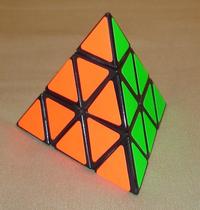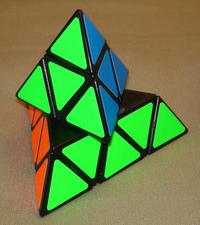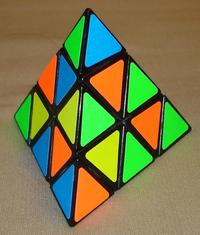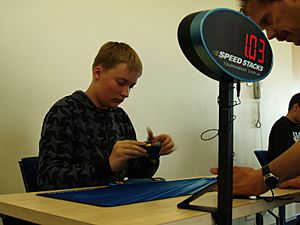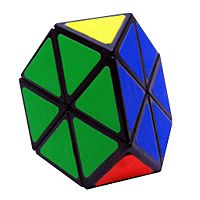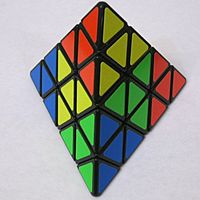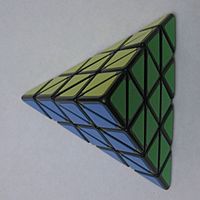Pyraminx facts for kids
The Pyraminx is a cool puzzle shaped like a tetrahedron, which is a pyramid with four triangle sides. It's a bit like the famous Rubik's Cube, but it's a pyramid instead of a cube! A person named Uwe Mèffert created and patented it after the original Rubik's Cube. Tomy Toys in Japan first introduced the Pyraminx in 1981.
Contents
What is the Pyraminx?
Uwe Mèffert first thought of the Pyraminx in 1970. But he didn't make it until 1981. He often says that if the Rubik's Cube hadn't been invented, his Pyraminx might never have been made.
The Pyraminx is a puzzle shaped like a pyramid. It has 4 main corner pieces, 6 edge pieces, and 4 small "tip" pieces. You can twist the puzzle along its cuts to mix up the colors.
How the Pieces Work
The 4 main corner pieces are like the centers of the puzzle. They can only spin around their own spot. The 6 edge pieces are the ones that really move around. The 4 small tip pieces are called "trivial tips" because they are super easy to solve. You can twist them by themselves without affecting the rest of the puzzle.
There's also a similar puzzle called the Tetraminx. It's just like the Pyraminx, but it doesn't have the small tip pieces. This makes it look like a truncated tetrahedron.
The main goal of the Pyraminx is to mix up all the colors. Then, you try to twist it back so each side has only one color.
Solving the Pyraminx
The small tip pieces are easy to line up with their main corner pieces. The main corner pieces are also easy to turn so their colors match. This means the real challenge is solving the 6 edge pieces.
You can solve the edges by doing certain twist patterns. These patterns move 3 edge pieces at a time. By combining different patterns, you can solve the whole puzzle. Some people find even faster ways to solve it!
How Many Ways Can a Pyraminx Be Mixed Up?
If you don't count the easy-to-solve tips, there are 933,120 different ways a Pyraminx can be mixed up. This is also the number of ways a Tetraminx can be mixed up. If you also count the main corner pieces as solved, there are only 11,520 ways. This makes the Pyraminx a puzzle that's fairly simple to solve compared to some others.
Fastest Solves and Records
The fastest time ever to solve a Pyraminx is 0.91 seconds! This amazing record was set by Dominik Górny from Poland on June 24, 2018.
The world record for the fastest average time of five solves is 1.86 seconds. Tymon Kolasiński from Poland set this record on April 6, 2019.
Top 5 Fastest Single Solves
| Name | Fastest solve | Competition |
|---|---|---|
| Dominik Górny | 0.91s | Byczy Cube Race 2018 |
| Rafał Waryszak | 0.97s | Santa Claus Cube Race Poland 2019 |
| Tymon Kolasiński | 0.98s | Byczy Cube Race 2018 |
| Adam Jagła | 1.04s | Santa Claus Cube Race Poland 2019 |
| John Gaynor | 1.04s | Michigan Cubing Club Delta 2019 |
Top 6 Fastest Average of 5 Solves
| Name | Fastest average | Competition |
|---|---|---|
| Tymon Kolasiński | 1.86s | Grudziądz Open 2019 |
| Luke Van Laningham | 1.88s | Garrettsville G-Men Classic 2020 |
| Drew Brads | 2.04s | World Championship 2017 |
| Junqi Feng (冯骏骐) | 2.12s | SJTU Winter Open 2018 |
| Dominik Górny | 2.14s | Dragon Cubing 2019 |
| Simon Kellum | 2.14s | Copper Country Winter 2020 |
Ways to Solve a Pyraminx
There are many different ways, or "methods," to solve a Pyraminx. These methods usually fall into two main groups:
- V first methods: In these methods, you first solve two or three edge pieces. Then, you use special steps to solve the rest of the puzzle.
- Top first methods: With these methods, you start by solving three edge pieces around one corner. After that, you use other steps to finish the puzzle.
Common V First Methods
- Layer by Layer: You solve one full side of the puzzle first. Then, you use one of five special patterns to solve the rest.
- L4E (Last 4 Edges): This is similar to Layer by Layer. You solve two edges around three center pieces. Then, you use patterns to solve the rest.
- Intuitive L4E: This method is like L4E, but it relies more on you seeing how the pieces move. You don't just memorize patterns; you figure out the best moves as you go. This is a more advanced method.
Common Top First Methods
- One Flip: You get two edges around one center solved, and the third edge is flipped. There are six main situations after this step, and you learn patterns for each. The last part uses a common set of patterns for all top first methods.
- Keyhole: You get two edges in the right spot around one center. The third edge doesn't match any color. You then use this "unmatched" edge to help solve the centers of the fourth color. The last step uses special "Keyhole last layer" patterns.
Many Pyraminx speedsolvers learn several methods. When they see a mixed-up Pyraminx, they quickly decide which method will be the fastest for that specific situation.
Different Kinds of Pyraminx Puzzles
There are a few different versions of the Pyraminx puzzle:
- Tetraminx: This is the simplest version. It's just like the regular Pyraminx but without the small tip pieces.
- Master Pyraminx: This is a bigger and more complex version. It has 4 layers and 16 triangles on each face. The original Pyraminx has 3 layers and 9 triangles per face.
The Master Pyraminx has many more pieces to move around. It has 4 tips, 4 middle centers, 4 main centers, 6 inner edges, and 12 outer edges. In total, it has 30 pieces you can move! However, some pieces are fixed in place or only spin, so only 18 pieces truly move around. Even though it's bigger, the Master Pyraminx has fewer possible combinations than a Rubik's Cube.
See also
 In Spanish: Pyraminx para niños
In Spanish: Pyraminx para niños
 | Emma Amos |
 | Edward Mitchell Bannister |
 | Larry D. Alexander |
 | Ernie Barnes |


